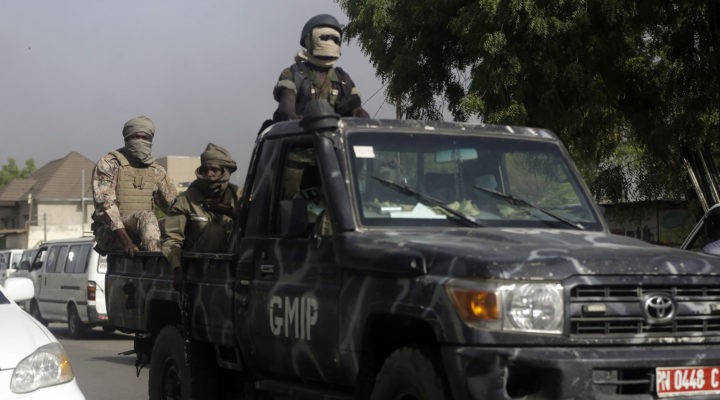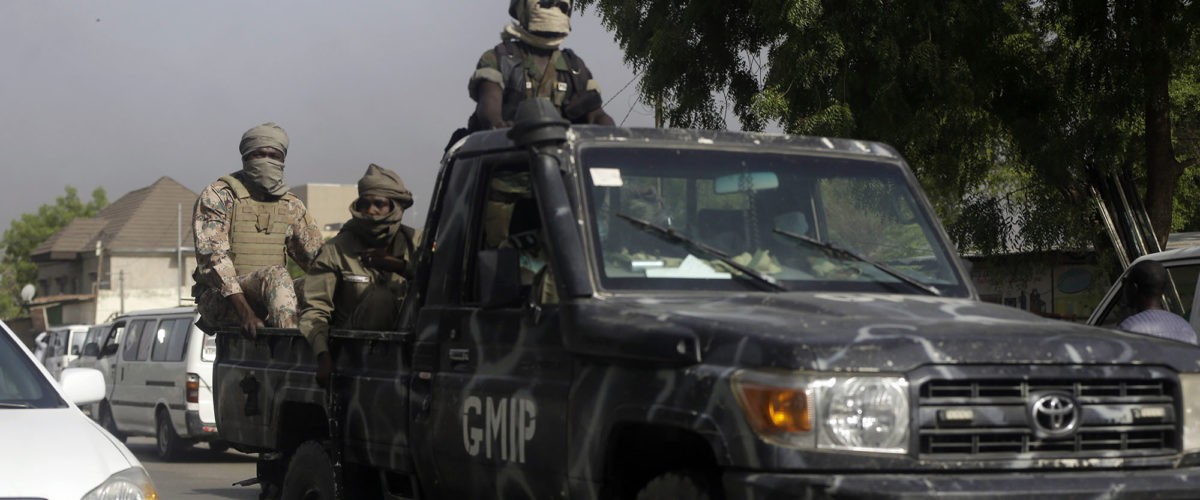In the past couple of weeks since the passing of Chadian leader Idriss Déby, the country has become a subject of local and international discourse unlike anything people remember of the West African nation in recent decades. The discussions center mainly on Déby’s death and how Chad will cope without a man who, for 30 years, served as its leader.
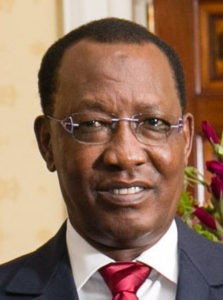
Idriss Déby (Photo by Amanda Lucidon)
Déby, 68, a former soldier turned civilian leader, reportedly died from injuries sustained while visiting Chadian soldiers battling to thwart the advancement of a rebel group called The Front for Change and Concord in Chad, FACT for short, that swooped on the country through the Libyan border.
While the fate of a man should in no way be tied to a nation, Déby’s three-decade grip on power, which would have extended for another five years had he lived, having emerged victorious in yet another election the very week he died, makes it compelling to do so. The manner of his death raises eyebrows. A president in the war front, overseeing or fighting alongside his troops to destroy the enemy? He had done it in the past, when he joined Chadian soldiers to dismantle a Boko Haram network in the country, a feat celebrated by the president with his troops on video, but the incursion by FACT turned out to be his Waterloo.
Details of how and where Déby met his death on April 19 remain unanswered. The Chadian military refuse to be drawn into divulging that information — leaving room for speculations and propaganda by the alleged killer, FACT. But of greater concern now among observers is the issue of security in Chad and the West African and Sahel region encompassing Niger, Libya, Cameroon, Nigeria, Burkina Faso, Mali, Mauritania, Sudan, Senegal and Eritrea.
Successful against Boko Haram
As the success of the Chadian forces against Boko Haram show, Déby achieved relative success against insurgents in the Sahel region, a fact attested to by close neighbors like Nigeria.
Mourning Déby’s death, President Muhammadu Buhari of Nigeria noted that “the late Déby had played a very active role in our regional joint collaboration in the military campaign against the Boko Haram terrorists,” and was “a friend of Nigeria who had enthusiastically lent his hand in our efforts to defeat the murderous Boko Haram terrorists that have posed grave security challenges not only for Nigeria, but also our African neighbors, particularly Chad, Cameroon and Niger Republic.”
With the warlord gone, the challenge now is for Buhari and other neighboring countries to sustain the fight against the terrorists, as anything less could signal a more grave security situation for the region.
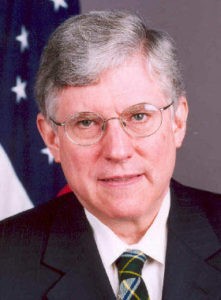
John Campbell
John Campbell, the Ralph Bunche senior fellow for Africa policy studies at the Council on Foreign Relations in Washington, D.C., admits that Déby was effective in the fight against terrorism. “Déby was a major force in the fight against various jihadi groups, and the Chadian military has been probably the strongest African military operating in the region, well trained, well equipped,” Campbell said.
An unconstitutional interim government
Following Déby’s death, the military announced the formation of an interim military government to be headed by the fallen president’s son, General Mahamat Idriss Déby, to oversee the country for 18 months, in what is a violation of the Constitution that requires the president of the national assembly to step in, in the event of the president’s death.
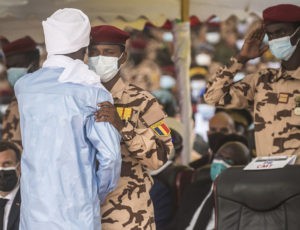
Son of the late Chadian president Idriss Deby, Mahamat Idriss Deby, head of the Transitional Military Council (CMT), right, greets his brother Zakaria Deby during the state funeral in N’Djamena, Chad, Friday, April, 23 2021. (Christophe Petit Tesson / Pool photo via AP)
“What the military have done is clearly not constitutional. One might argue that it amounts to a coup,” Campbell noted, adding, “In terms of what the consequence would be, I think much would depend on how the Chadian people react.”
While there had been reports of demonstrations in N’Djamena against the new military junta, it is difficult to judge how significant those protests are, he said. But what isn’t difficult to contemplate is the threat from FACT.
“What does seem to me to be pretty clear is that the insurgents that were moving south towards N’Djamena had led to the fighting with the Chadian military in which Déby was killed, those insurgencies are ongoing, and have not been defeated. So what the relationship will be between a change of government in N’Djamena and those insurgencies …. much depends on whether the new regime in N’Djamena is willing to continue that fight, whether it’s going to focus mostly on the insurgents that are moving south towards N’Djamena, or whether it’s going to be distracted by the necessity of trying to cling to power,” explained Campbell, who served as U.S. ambassador to Nigeria from 2004 to 2007.
The protests in Chad against the new military regime, the latest of which was on Saturday, May 8, have led to the death of at least six people from the earlier demonstration. A statement by the Chadian military said that the “so-called peaceful demonstration paradoxically resulted in the deliberate destruction of 15 national police vehicles and two (gas) stations belonging to the Total company,” and “intentional assaults on law enforcement officers.”
The military insist the new interim arrangement it put in place is necessary to guarantee stability in the country, but critics say it is a ploy to sustain a dynasty or prolong military rule.
The invading threat remains
FACT, for its part, emboldened by the death of Déby, has threatened to fight on. FACT had been active in Libya before its incursion into Chad.
Once a stable country, Libya descended into anarchy shortly before the country’s previous leader, Muammar Gaddafi, was killed in the aftermath of the Arab Spring in 2011 and had, until a recent cessation of hostilities and setting up of an interim administration, intermittently grappled with chaos and civil war as rebel groups and fighters continued to fight for dominance and space within the country. The civil unrest in the country was fueled in large part by an inflow of arms, gangs and terrorist groups operating within the country and Sahel routes.
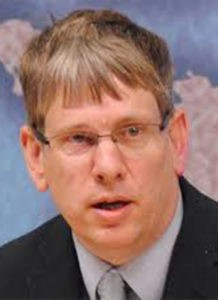
Alex Vines
Alex Vines, Africa director for Chatham House, in an interview prior to Déby’s death, said “the Sahel is an extensive region with international boundaries that mean little to those on the ground. The trade and smuggling routes often pre-date the colonial carve-up, and these porous borders are easy for armed militants and transnational organized crime groups to navigate.”
Three weeks after the death of Déby, the United States Commission on International Religious Freedom, in a report titled “Violent Islamist Groups in the Central Sahel” authored by policy analyst Madeline Vellturo, noted: “In recent years, the central Sahel has experienced the largest increase in violent extremist activity of any region, with violent incidents linked to militant Islamist groups increasing nearly seven-fold since 2017.” It added that “despite territorial expansion in recent years, militant Islamist groups in the Sahel enjoy little popular support from local communities, leading to high levels of violence against civilians. These militant groups routinely employ intimidation and force to impose their will in areas they seek to control.”
For now, the Chadian situation remains foggy, and while the days and months ahead may reveal who, between the rampaging insurgents and government forces, will have the last word, Campbell feels the best way to tackle insurgency in Africa is by focusing on the root cause of the crisis.
“In general, the advice that I would offer is that the insurgencies reflect populations that have been marginalized and ill governed for generations. And if the root causes of the insurgencies are to be addressed, it means greatly improving the level of governance, reform of the security services, both the police and military. All these things take time, and that is what is extremely difficult about the current situation. How do you institute reforms, presuming you have the military will to do so, when the insurgency is on the march?”
Anthony Akaeze is a Nigerian-born journalist now living in Houston. He covers Africa for BNG.
Related articles:
Climate change is heating up the terrorist conflict in Africa’s Sahel region
Buckle up: Global turbulence ahead | Analysis by Erich Bridges
Boko Haram is still plaguing Nigeria claiming to do God’s work | Analysis by Anthony Akaeze

